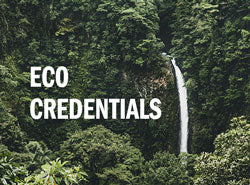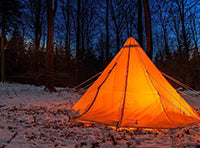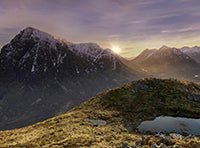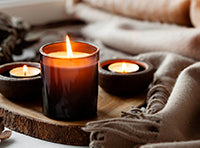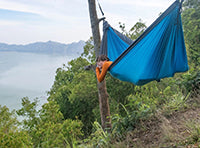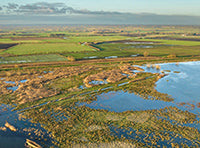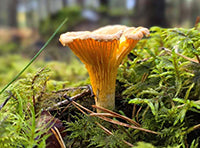“Why on earth would you go wild camping if you could book a hotel or B&B?” That’s a question I’ve been asked innumerable times by my city-dwelling friends who just don’t get it. To them my hobby is a source of bemusement and ridicule. But I always just laugh off their good-natured banter, because I’m utterly convinced in one simple fact – that wild camping is a magical, memory-forging, happiness-inducing pursuit capable of changing your life for the better.
I discovered wild camping a decade ago – and ever since that first scary but eye-opening night under the stars I’ve been addicted. I’ve wild camped over 200 times, mostly in the national parks of the UK but abroad as well, and I’ve loved every minute. Pitching my tent atop a rugged mountain summit or laying out my bivvy bag in an atmospheric forest has always brought me boundless happiness, re-opening my eyes to the wonders of the world. Why? Because wild camping is escapism in its purest form; it is losing yourself in nature; it is feeling vulnerable and exposed – and surviving; it is getting far away from roads, cities, shops and mobile-phone reception; it is resetting your equilibrium; and, ultimately, it is just good, old-fashioned, adventurous fun.
My first forays into wild camping were out of necessity – needing somewhere to sleep during multi-day hiking trips. I can vividly remember feeling anxious and scared: darkness freaked me out, night-time noises sparked horrifying thoughts, and I was convinced an angry landowner would catch me in the act. But, despite my trepidation, I gave it a go and overcame my fears by using two simple tactics: firstly, I camped with a friend to gift myself that reassuring sense of safety in numbers, and secondly I deliberately engaged the logical side of my brain – telling myself repeatedly that ghosts and monsters don’t exist, and that statistically-speaking it’s far safer up a remote hill than on the streets of Birmingham back home. One wild camp turned into two, then three, then ten, and nothing bad ever happened. Before I knew it I was a seasoned wild camper and my initial fears had melted away, replaced instead with new emotions of excitement, joy and anticipation. I had incredible experiences: unzipping my tent to the sight of a majestic stag in the Scottish Highlands; watching the sunset over the Langdale Pikes’ jagged skyline in the Lake District; and waking up to an impossibly-idyllic cloud inversion in Snowdonia. Over the years, I began to gain a real insight into the joys and benefits of wild camping – and this is what I found out.
For millennia humans have existed in the wild, their lives connected closely to nature and landscape. But, in recent centuries, city-based, tech-centric life has become the norm, depriving humans of their intrinsic and natural yearning to be in the wild. That is why wild camping can feel so intuitively good for you; almost like coming home. Humans were nurtured in the wild and the wild is embedded within us – and camping helps us reconnect with that innate part of us.
If at home you feel stressed, agitated and frustrated, then in wild places you might just feel happy, relaxed and free. The mental health benefits of spending time and exercising outdoors are scientifically-proven – and wild camping is no exception. It’s good for the soul; a therapeutic and healing activity that gives you time for solitude, self-reflection and quiet. Everybody’s experience will be different, but wild camping might just clear you head and empower you to put life’s little problems into perspective, or simply enable you to unwind and de-stress.Your anxieties may well float away; your mood will be restored, boosting your energy and vitality; and you might just feel rejuvenated, with renewed resilience to face life in a positive way. If you use wild camping as a time to unplug from social media and switch off from the incessant noise of online life, these mental health benefits will be amplified further too.
Wild camping is the best way to have an authentic, intimate interaction with an incredible landscape. It gives you the time and space you need to escape the crowds, get off the beaten track and truly drink in the location. When sipping a coffee, alone, outside your tent, your senses will be heightened and you can savour the sounds, smells and sights of nature in a way like never before. You have a better chance of witnessing natural phenomena, like cloud inversions, sunrises and sunsets; you can take the time to genuinely look at and notice the beauty of your surroundings; and, if you’re lucky, you might encounter iconic wildlife such as stags or eagles in their natural habitat.
There’s always an edge of unpredictability to wild camping. Will you find a good pitch? Who will you meet along the way? Is your camping gear robust enough for the weather? Will the sunshine prevail or give way to torrential downpours and howling gales? Will you be brave enough to see it through or will you wimp out? This unpredictability can be scary and unsettling, but also exciting and thrilling – and by facing up to these unknowns you can learn a lot about yourself, your limits and your strengths and weaknesses.
The challenges you encounter during a wild camp will, in many ways, reflect the obstacles and difficulties you face in everyday life, and the skills and attributes you use to overcome challenges during a wild camp can better equip you to cope effectively with normal life. For example, every wild camp will test several skills, including decision-making, problem-solving, critical thinking, self-awareness and resilience to hardship. A successful wild camp, particularly a solo camp, can therefore give you a wonderful sense of achievement. The knowledge that you went outside your comfort, faced your fears and overcame them – with only yourself to rely on – will increase your confidence and build self-esteem. But failures or mishaps can be formative too, teaching you about dealing with disappointment and having the resilience to bounce back.
There are so many other benefits to wild camping: the fresh air, the escapism, the clarity and simplicity of back-to-basics living, the happiness-inducing endorphins you get from exercise, losing weight or building up your muscles, enjoying good camp food and a tipple, and the massive savings you can make (meaning more money for new adventures).
-
Don’t rush to choose your camp – take time to scout out flat, dry and sheltered ground
-
Everyone loves a good view – position your door so it opens up to the best panorama
-
Treat yourself – a tasty midnight snack or a favourite tipple will boost your morale no end
-
Take ear plugs with you – they’ll help you sleep if it’s really windy or raining heavily
-
Set your alarm – waking up for sunrise will give you a magical experience
-
No-one likes feeling cold – take a warmer sleeping bag and mat, so you feel sufficiently cosy
-
Remember a bin bag – a large zip-lock bag will be super-useful for stashing your rubbish
-
Don’t overpack – keep it ultralight to avoid backache and move faster through the hills
-
Stay fresh – put a tumble dryer sheet in the bottom of your sleeping bag to stop it smelling musty
-
Keep your phone on airplane mode – a digital detox will enhance your wild camping experience
Happy wild camping!

